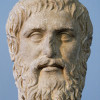“ The highest love is the love not of a person, but of the highest and purest abstraction. ”
Plato, Symposium. copy citation
| Author | Plato |
|---|---|
| Source | Symposium |
| Topic | love abstraction |
| Date | |
| Language | English |
| Reference | |
| Note | Translated by Benjamin Jowett |
| Weblink | http://www.gutenberg.org/files/1600/1600-h/1600-h.htm |
Context
“In the Phaedrus and Symposium love is not merely the feeling usually so called, but the mystical contemplation of the beautiful and the good. The same passion which may wallow in the mire is capable of rising to the loftiest heights—of penetrating the inmost secret of philosophy. The highest love is the love not of a person, but of the highest and purest abstraction. This abstraction is the far-off heaven on which the eye of the mind is fixed in fond amazement. The unity of truth, the consistency of the warring elements of the world, the enthusiasm for knowledge when first beaming upon mankind, the relativity of ideas to the human mind, and of the human mind to ideas, the faith in the invisible, the adoration of the eternal nature, are all included, consciously or unconsciously, in Plato's doctrine of love.”
source


